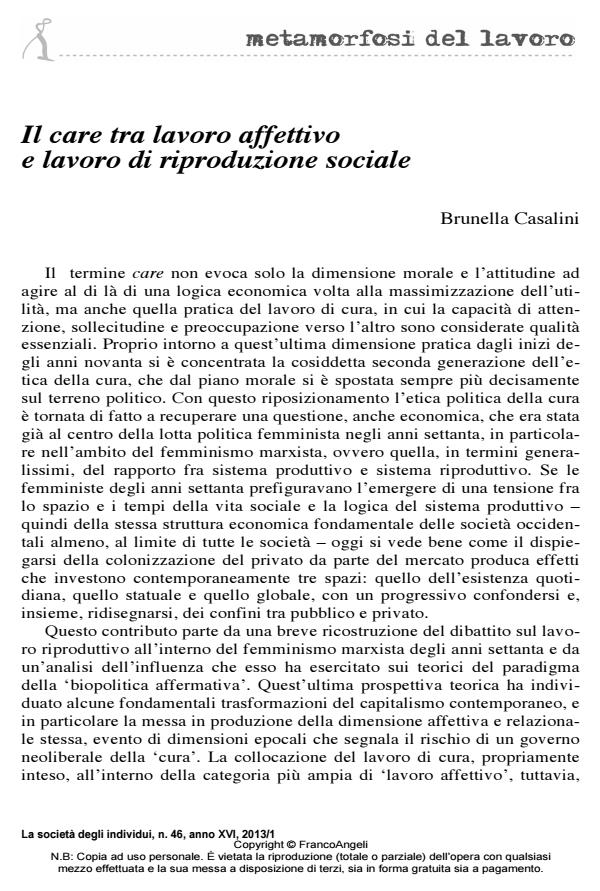Il care tra lavoro affettivo e lavoro di riproduzione sociale
Titolo Rivista SOCIETÀ DEGLI INDIVIDUI (LA)
Autori/Curatori Brunella Casalini
Anno di pubblicazione 2013 Fascicolo 2013/46
Lingua Italiano Numero pagine 18 P. 44-61 Dimensione file 3294 KB
DOI 10.3280/LAS2013-046004
Il DOI è il codice a barre della proprietà intellettuale: per saperne di più
clicca qui
Qui sotto puoi vedere in anteprima la prima pagina di questo articolo.
Se questo articolo ti interessa, lo puoi acquistare (e scaricare in formato pdf) seguendo le facili indicazioni per acquistare il download credit. Acquista Download Credits per scaricare questo Articolo in formato PDF

FrancoAngeli è membro della Publishers International Linking Association, Inc (PILA), associazione indipendente e non profit per facilitare (attraverso i servizi tecnologici implementati da CrossRef.org) l’accesso degli studiosi ai contenuti digitali nelle pubblicazioni professionali e scientifiche.
The aim of this paper is twofold. Firstly, it reconstructs the early marxist feminist debate about reproductive labour, and its deep influence on the paradigm of affirmative biopolitics as well as on the development of the concept of ‘affective labour’. Secondly, it shows how the concept of affective labour, and other related concepts also present in the contemporary sociological literature (such as ‘emotional’ and ‘intimate’ labour), are still too broad and vague: they are not able to conceptualize effectively all the specific problems involved in the commodification of care work, by now a generalized phenomenon on a global scale. Joan Tronto’s political ethics of care offers, in comparison, a more precise and clearly delimited definition of ‘care’, starting from the ‘needy’ nature of every human being. Therefore, the use of such a definition can help us better to frame and to understand the transformations of contemporary welfare state.
- Challenging the Borders of Justice in the Age of Migrations Alessandra Sciurba, pp.225 (ISBN:978-3-030-05589-9)
Brunella Casalini, Il care tra lavoro affettivo e lavoro di riproduzione sociale in "SOCIETÀ DEGLI INDIVIDUI (LA)" 46/2013, pp 44-61, DOI: 10.3280/LAS2013-046004